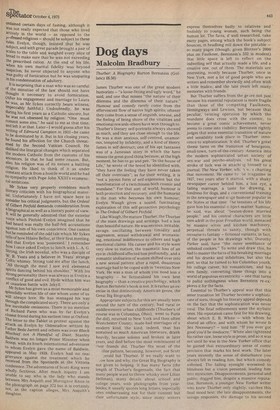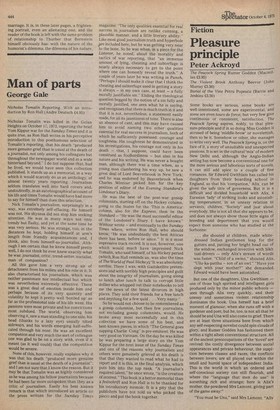Dog days
Malcolm Bradbury _
Thurber: A Biography Burton Bernstein (Gollancz £6.50) James Thurber was one of the great modern humorists — "a loose-fitting and ugly word," he said, and one that misses "the nature of their dilemma and the dilemma of their nature." Humour and comedy rarely come from the effervescent flow of native high spirits; oftener they come from a sense of anguish, unease, and the feeling of being shorn of the vitalities and emotional rewards others have won through to. Thurber's literary self-portraits always showed as much, and they are close enough to the life. He was a man anxious, self-centred, unamorous, tempted by infidelity, and a kind of Henry James in self-destruct; one of his apt fantasies was of a Jamesian story in which the hero misses the great good thing because, at the high moment, he has to go and pee. "In the house of Life," he wrote of the breed he identified with, "they have the feeling they have never taken off their overcoats"; as for their writing, it is "not a joyous form of self-expression but the manifestation of a twitchiness both cosmic and mundane." For that sort of world, humour is both protection and recovery, and the humorist is the man who becomes his own humour; Evelyn Waugh gives a sound, fascinating exploration of this self-protective psychology in The Ordeal of Gilbert Pinfold.
Like Waugh, the mature Thurber, the Thurber of the main drawings and writings, had a less than beautiful nature. He was envious, irritable, savage, oscillating between timidity and aggression, sexual withdrawal and womanising, emotional indifference to others and high emotional claims. His career and his style were very slow to mature, the traumatic loss of an eye in childhood affected him profoundly, and a romantic idolisation of women shifted over into a new sexual pattern after a rapid, disastrous marriage had to be coped with in 'twenties New York. He was a man of whom you need less a biography — he fictionalised his own best biography — than a creative psychology, which Burton I3ernstein's book is not. It is rather an exercise in that distinctively American genre, the Great Big Biography.
Appropriate subjects for this are usually born around the turn of the century, had rural. or middlewestern urban childhoods (Thurber's of course was in Columbus, Ohio), went to Paris (he did), returned to New York and then often Westchester County, made bad marriages of a modern kind, the kind, indeed, that has sustained so much American literature, drank heavily, became solemn and broken in later years, and died before the most reminiscent of heir friends did. Thurber fits most of the uliar pattern, becoming, however, not Scott .serald but Thurber. If we really want to
.ow how and why, the Great Big Biography is not given to helping. It has many facts (the length of Thurber's fingernails, the fact that many people want to throw whisky over Lilian Hellman), many details about school and college years, with photographs from yearbooks; it usually quotes long letters, especially ones embarrassing not for their content but their unfortunate style, since many writers express themselves badly to relatives and foolishly to young women, such being the human lot. The facts, if well researched, take many pages, among which the book's subject bounces, in headlong roll down the pintable — so many pages (though, given Blotner's 2000 plus on Faulkner, Bernstein's 532 is modest) that little space is left to reflect on the indwelling self that actually made a life, and a creative one, out of them. The materials are interesting, mostly because Thurber, once in New York, met a lot of good people who are writers and remember shrewdly and often with a little malice, and the late years left many memories with friends.
But Thurber suffers from the ge.ire not just because his essential reputation is more fragile than those of the competing Faulkners, Hemingways and Lewises, but because that peculiar, twisting operation by which the mundane does cross with the cosmic, to become a great comic achievement, never seems to come into visibility. Bernstein rightly judges that some essential transition of nature and sensibility took place in Thurber: innocence to sophistication. It did; Thurber's great theme turns on the transition of bourgeois, small-town, turn-of-the-century America into the modern sophisticated urban society of sex-war and psycho-analysis, : nd his great stroke of luck was in attachi lg himself to a
journal, The New Yorker, whi h s charting that movement. He came to he magazine in 1927, two years after it started, with a shaky newspaper career behind him, a lost eye, a failing marriage, a taste for drawing, a fondness for dogs, and a conventional training in the nevvspaper and stage humour popular in the States at that time. ['he tensions of his life gave him his essential si,bject-matter; humour., he said, was about "beaten-down married people," and his central characters are little men adrift in the post-Freudian world, menaced by massive wives and kitchen machinery, perpetual threats to sanity, though with recourse to fantasy — fictional variants, in fact, of the people in his drawings who, Dorothy Parker said, have "the outer semblance of unbaked cookies." To write and draw this, he had to master the facts of his breaking marriage and his drunks and infidelities, but also the past, so that he turned to his Columbus youth, his college career, his romanticism, and his own family, converting these things into a world of populous eccentricity — one that turns to pallid nothingness when Bernstein re-explores it for the facts.
Essential to Thurber's appeal was that this inner transition let Thurber become a sophisticate of sorts, though his literary appeal depends on the fact that the sophistication was never total. The final refinements were the stylistic ones. His reputation came first for his drawing, about which E. B. White — with whom he shared an office, and with whom he wrote Is Sex Necessary? — told him: "If you ever got good you'd be mediocre." White also tightened his rather raw, loose style in prose, and so it was not until he was in the New Yorker office that he gained that extraordinary sense of comic precision that marks his best work. The later years intensify the sense of disturbance you always felt in reading him, but which comedy softened. The failing eyesight worsened to blindness but a vision persisted, leading him into mysticism. Disappointments, personal and public, dogged him, despite a massive reputation. Bernstein, a younger New Yorker writer who knew Thurber only slightly, catches this final mood best: the late disappointments, the savage responses, the damage to his second marriage. It is, in these later pages, a frightening portrait, even an alienating one, and the reader of the book is left with the same problem of relationship to Thurber that Bernstein himself obviously has: with the nature of the humorist's dilemma, the dilemma of his nature.



































 Previous page
Previous page